Posted June 22, 2020 by Nicky in Reviews / 3 Comments
 Murder in the Mill-Race, E.C.R. Lorac
Murder in the Mill-Race, E.C.R. Lorac
Lorac starts this book by setting the scene, with a young doctor and his wife moving to an idyllic little village on the moor, self-contained and insular. They’re quickly accepted because of the doctor’s skills, of course, but there’s a little friction with a staple of the place: Sister Monica, a rather severe woman who rules over a little children’s home with an iron fist. Everyone says she’s “wonderful”, and yet there’s something forced about the superlative.
Since it’s a Golden Age crime novel, no surprises that Sister Monica is the one found dead, and that it unravels a whole snarl of issues in the little village. Lorac’s series detective, Macdonald, comes in to take a look — understanding the ways of a small village, but not bound by then, and able to cut some of the knots with plain-speaking and an inability to be rattled.
As always, Lorac is great with a sense of atmosphere: you can practically hear the sounds of the village, smell the scrubbed barren children’s home, feel the spray of the water in the mill race. The killer was the person I guessed, but Lorac avoided tying things up in too neat a bow: there are a couple of questions unresolved, and there’s no “sit all the culprits together in a room” moment. You do get a sense for how her detective works and how she likes to shape a mystery, after reading a few of her books — there are commonalities between this and her other books that felt a bit fresher the first time you read them.
Overall, though, Lorac’s ability to portray a place and a bunch of complicated characters remains a big draw, and I think her books are among the finer ones in the British Library Crime Classics collection (contrast Bude, for example, who I find entertaining but unremarkable as far as style goes).
Rating: 4/5
Tags: book reviews, books, British Library Crime Classics, crime, mystery
Posted June 19, 2020 by Nicky in Reviews / 0 Comments
 The Sussex Downs Murder, John Bude
The Sussex Downs Murder, John Bude
The Sussex Downs Murder is the third book I’ve read by John Bude from the British Library Crime Classics series, featuring the same detective as the previous two. Meredith is a policeman, and much of the story involves careful police work: cross-checking, putting a man on this and a man on that, and slowly amassing more evidence — so much that at first it’s hard to sort out what’s relevant and what isn’t, and which of the herrings are a suspiciously ruddy colour.
Bude’s writing is like that: methodical, thorough, a little slow, but ultimately assembling a pretty fascinating picture, with some nice set-pieces along the way. I don’t visualise things easily, but Bude brought to life the chalky cliff and the grassy downs of the setting, as his characters walk through them — a sketch, perhaps, but one that suggests just enough to contextualise what the artist wants to show.
I’ll admit that I find John Bude’s plots a trifle obvious, though Martin Edwards’ introductions don’t always help with that. He dropped a clue that raised my eyebrow right at the start, so I figured out where we were going. Still, I didn’t know quite how we’d get there, and with Golden Age crime fiction that’s usually the main thing.
In all, it’s a solid story, I didn’t spot any major holes, and it has its moments for characterisation, setting and humour. Not perhaps the best of the series, but an enjoyable specimen of the species.
Rating: 3/5
Tags: book reviews, books, British Library Crime Classics, crime, mystery
Posted May 30, 2020 by Nicky in Reviews / 2 Comments
 The Colour of Murder, Julian Symons
The Colour of Murder, Julian Symons
This British Library Crime Classic is from later in the development of the genre than some others, with half the book consisting of the rambling story a man tells to a psychologist after being accused of a murder he can’t remember committing. It’s powerfully cringy, as you can see the narrator deluding himself, and pitiful too, because he’s half-aware of himself, and there’s (as someone later remarks) a sort of innocence about him. He seems to have ended up where he is by accident, and without quite understanding, and his mind seems to be gently unravelling… even though now and then he shows insight.
As a piece of writing, it’s excellent; it makes for discomforting reading.
The latter half of the book pulls back, finally admitting just who has been killed (it was one of the two characters I would’ve predicted), and showing the preparations for the trial (and finally the trial itself). This bit is more of a sketch, lingering on details here and there… but mostly just wrapping up the story implied by the opening narrative, which I found a lot stronger.
The ending is sort of predictable once you’ve seen all those details. It makes sense that the story needs wrapping up — you can’t leave that narrative on its own — and yet it all rather weakens and cheapens the effect. A bit of a mixed one for me, now I think about it in that light. Definitely worth a read if you’re interested in the Crime Classics series, though; this is definitely a stand-out for that narrative voice.
Rating: 3/5
Tags: book reviews, books, British Library Crime Classics, crime, mystery
Posted May 23, 2020 by Nicky in Reviews / 0 Comments
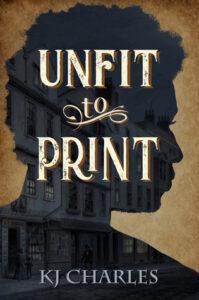 Unfit to Print, K.J. Charles
Unfit to Print, K.J. Charles
I was feeling fidgety, so I decided to read for a book by K.J. Charles I hadn’t read yet. Unfit to Print is a standalone, following Gil Lawless and Vikram Pandey, the owner of a dirty bookshop and a high-flying lawyer, respectively. They knew one another at school, but have been separated for quite a long time, with Vik believing Gil to be dead. He’s looking for the son of a local Indian family, though, and that takes him to the street where Gil keeps his bookshop… and there they run into one another again.
Gil’s been hurt a lot and is as prickly as a hedgehog, while Vik’s not been interested in anyone since Gil’s disappearance from their boarding school. They quickly fall into their old intimacies, though Gil finds it hard to offer anything other than the physical and Vik finds it hard to take the physical aspect without the feelings getting in the way. At the same time, Gil needs to help Vik find out what happened to the boy he’s looking for, while trying not to get his reputation all smeared up for him…
It’s a lovely little second chance, and I quickly fell for both characters and their silly desperate attempts not to get hurt more when they’re already stumbling along with plenty of hurt to spare from their pasts. Their interaction smoulders as usual — holding hands was never so sexy — and it was a really fun read overall. The mystery aspect was a little bit perfunctory; it felt a bit of a letdown for the answer to be that easy, but it did make sense as well.
All in all, plenty of fun, though not for all the family!
Rating: 4/5
Tags: book reviews, books, crime, K.J. Charles, mystery, queer fic, romance
Posted April 25, 2020 by Nicky in Reviews / 0 Comments
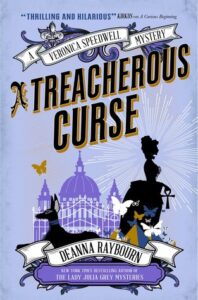 A Treacherous Curse, Deanna Raybourn
A Treacherous Curse, Deanna Raybourn
In their third outing, Veronica Speedwell and Revelstoke Templeton-Vane (better known simply as Stoker) have to unravel the mystery of a mummy’s curse, to salvage what’s left of Stoker’s reputation. That means hunting for the man who stole Stoker’s wife, dealing with said wife (who turns out to be a real piece of work, the clues about which I felt like I’d missed), and figuring out what exactly is going wrong with the exhibition of the funerary goods of an Egyptian princess. As with the previous two books, it’s a lot of fun, and I read it almost in one go.
The main draw for me is Veronica and Stoker’s relationship. They’re delightfully volatile, and yet you know it’s because they’re alike and are good for one another. Veronica’s unbelievable, of course, but taking that as read I just relax into it. Of course she can do more or less anything, and faces very little censure. Why not? Anyway, now these books are very much about the will-they-won’t-they for me, and I can’t say they made as much progress as I hoped — though at least more of Stoker’s past has been revealed!
The mystery was fun enough; I can’t resist a bit of Egyptological jiggery-pokery, I have to confess. I did work things out ahead of the reveals, in most cases, but it still worked for me. It’s not about the result, but how you get there, and Veronica and Stoker do it in style.
Rating: 4/5
Tags: book reviews, books, crime, Deanna Raybourn, mystery
Posted April 23, 2020 by Nicky in Reviews / 0 Comments
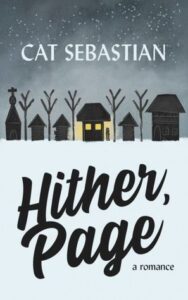 Hither, Page, Cat Sebastian
Hither, Page, Cat Sebastian
Things this novel is not:
- Solely a romance.
- Solely a mystery.
Leo Page is, in the simplest terms, a spy. He’s sent to a sleepy English village that could come right out of Agatha Christie’s novels, where he meets a young doctor with PTSD who (coincidentally, even though I half-expected this to become relevant) knows a little about who he is and what he does because he patched him up under secretive conditions during World War II. The story is both about solving the mystery, and also about unravelling who Leo wants to be.
I felt that James (the doctor) is rather less developed than Leo; we see his PTSD and his eagerness to love and be loved, yes, but we don’t really see him finding any peace with the PTSD or settling into himself as he could be. There’s plenty of room for that in sequels, though! What we do see is Leo’s development as he slowly becomes sure that, actually, he’s done with being a spy and directly or indirectly dealing death. It takes him time to realise that and time to decide that a life with James is worth a try.
In terms of the romance between the two, there’s a happy-for-now at the end of the book, but it’s something I could see being shaken by future books — they’re not secure in one another yet.
The mystery… eh, I was less interested in that, I’ll admit. It’s weird reading a book with such modern sensibilities and then also reading an Agatha Christie mystery, really. On that level, this fell down a bit for me, not helped by the fact that (as was traditional for Golden Age crime fiction) the victims were both unlikeable. The character of Wendy causes a certain amount of mystification, and I found her a little too much; a little too clever, a little too omnipresent, a little too obvious.
That’s really a small quibble, though it doesn’t sound it: I was here for James and Leo. Their sexual connection doesn’t boil off the page, but there are several lovely moments of intimacy which I rather prefer.
Rating: 4/5
Tags: book reviews, books, Cat Sebastian, crime, mystery, romance
Posted April 8, 2020 by Nicky in Reviews / 0 Comments
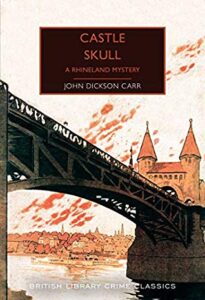 Castle Skull, John Dickson Carr
Castle Skull, John Dickson Carr
I don’t know why I persist in subjecting myself to John Dickson Carr. This is the third book of his I’ve tried, I think, and it’s just… not for me. His work feels stilted and contrived, lacking the style of someone like Dorothy L. Sayers or the breeziness of Agatha Christie’s best. His genius detective, all but infallible, all but omniscient, just gets on my nerves. In fairness, almost all of the clues are there, but it’s hard to solve the mystery (though in another sense, it’s obvious) when everybody is so opaque; not even the Watson really feels alive, despite the access to his thoughts you have with him as the narrator.
Just… not for me, and I really need to remember that; I’ve had the same problem with Dickson Carr’s other series detective, and I just… don’t enjoy the contrived nature of his plots.
This is the second book in the British Library Crime Classics line of reissues that featured the sealed book ending: if you could take it back to the place you bought it without cutting it open to read the ending, you got your money back. It’s sort of interesting to think about that kind of gimmick. I wonder how well it worked! I can’t remember which Golden Age book I’ve read did this now… maybe it was John Dickson Carr’s other book, though?
In any case, argh, I should have put this down and given up, but I still had the tiniest bit of curiosity to satisfy.
Rating: 1/5
Tags: book reviews, books, crime, mystery
Posted March 2, 2020 by Nicky in Reviews / 0 Comments
 The Honjin Murders, Seishi Yokomizo, trans. Louise Heal Kawai
The Honjin Murders, Seishi Yokomizo, trans. Louise Heal Kawai
The Honjin Murders is a classic Japanese murder mystery in translation, drawing very much from the sort of locked room mysteries favoured by John Dickson Carr, whose books are even referenced in the story. A couple are slain on their wedding night, and a mysterious three-fingered man is implicated, though the room the two were in was locked from the inside and no one should have been able to gain access.
It’s a bit of an odd set-up, because the story is told by a writer of detective fiction who only finds out about the murder later — it’s written as if it’s a true crime story being reconstructed after the fact, which does at times give it a blandness. There’s no real urgency to it, though partly that’s probably due to the translation. Other than the fact that it’s in translation, it’s not particularly uniquely Japanese; there are kotos and katanas and tatami mats, but exchange a few details and it’s a book by John Dickson Carr. That might be an upside, for you… however, I’m afraid I don’t really get along with John Dickson Carr, though I persist in trying.
It was so deliberately referential and so distant from the action, it just didn’t really work for me.
Rating: 2/5
Tags: book reviews, books, crime, mystery
Posted February 28, 2020 by Nicky in Reviews / 0 Comments
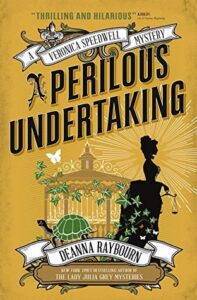 A Perilous Undertaking, Deanna Raybourn
A Perilous Undertaking, Deanna Raybourn
The second Veronica Speedwell book is much like the first, with Veronica being asked to work to investigate a crime more or less at the whim of her newly discovered family, who are of course highly placed and quite able to make themselves a nuisance if she doesn’t do as they ask. Naturally, Stoker won’t leave her to investigate alone, though he’s more than a bit miffed that she’s agreed to the whole proposal.
Their delightfully adversarial friendship continues, and I find myself torn between them continuing to be more-or-less platonic besties and actually getting together oh my goodness please. It’s obvious that’s where they’re heading, but I find myself impatient for them to get there so I can see how they fit together. Some mysteries continue — what happened to Stoker’s wife? — and there are some new ones introduced in just the last few pages, revealing some more of Veronica’s tumultuous travels but mostly just hinting at the things she’s faced down before.
The mystery itself was fairly obvious, and so was the meta-mystery from the last book (who is pulling Sir Hugo’s strings?), but it remains fast-paced and highly enjoyable. The bond between Stoker and Veronica is what drives things, for me — their needling of each other, and yet their growing reliance on each other too. I’ll be picking up the third book, and soon!
Rating: 4/5
Tags: book reviews, books, crime, historical fiction, mystery, romance
Posted February 24, 2020 by Nicky in Reviews / 0 Comments
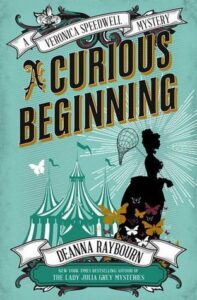 A Curious Beginning, Deanna Raybourn
A Curious Beginning, Deanna Raybourn
A Curious Beginning opens with the funeral of Veronica Speedwell’s aunt, one of the two women who raised her under somewhat irregular circumstances. She is a foundling and illegitimate, and that’s all she knows of her family. She’s her own woman, interested in lepidoptery and very competent at taking care of herself, arranging expeditions to find butterflies, selling them, and submitting papers. She conducts her love affairs discreetly far from British shores, and is generally a rather anachronistic but appealingly independent character.
This translates at times into her being rather blasé, including about the raid on her aunts’ cottage she finds when she returns to the accommodation. She is met there by a man who helps protect her and then begs her to let him take her to London and keep her safe. To cut a long story short, this ends in his murder and her being thrown together with a foul-tempered naturalist (with nonetheless appealing looks, as we hear frequently), Stoker.
The plot itself… there were points where I literally said “what the fuck” aloud, in the last 50-100 pages. There are period trappings, but Veronica is a firmly modern protagonist, not so much chafing at the rules of her time as barely acknowledging they exist. This would normally drive me up the wall, so I wasn’t sure if I even liked the book… but given how fast I swallowed it down, I guess I did! It’s not great historical fiction, but it is rather fun as a mystery (and probable romance), as long as you go into it with the understanding that it isn’t really a period story, and that the characters aren’t exactly deep. They’re glossy and fun and forever moving, but they don’t have emotional depth, in my view; Veronica’s always so matter-of-fact that she breezes right past emotion, and we don’t get to see much of Stoker’s past to judge his brooding against.
This sounds like damning with faint praise, but I really did fly through the book and immediately pick up the sequel. It’s good fun.
Rating: 4/5
Tags: book reviews, books, crime, mystery, romance
 Murder in the Mill-Race, E.C.R. Lorac
Murder in the Mill-Race, E.C.R. Lorac








